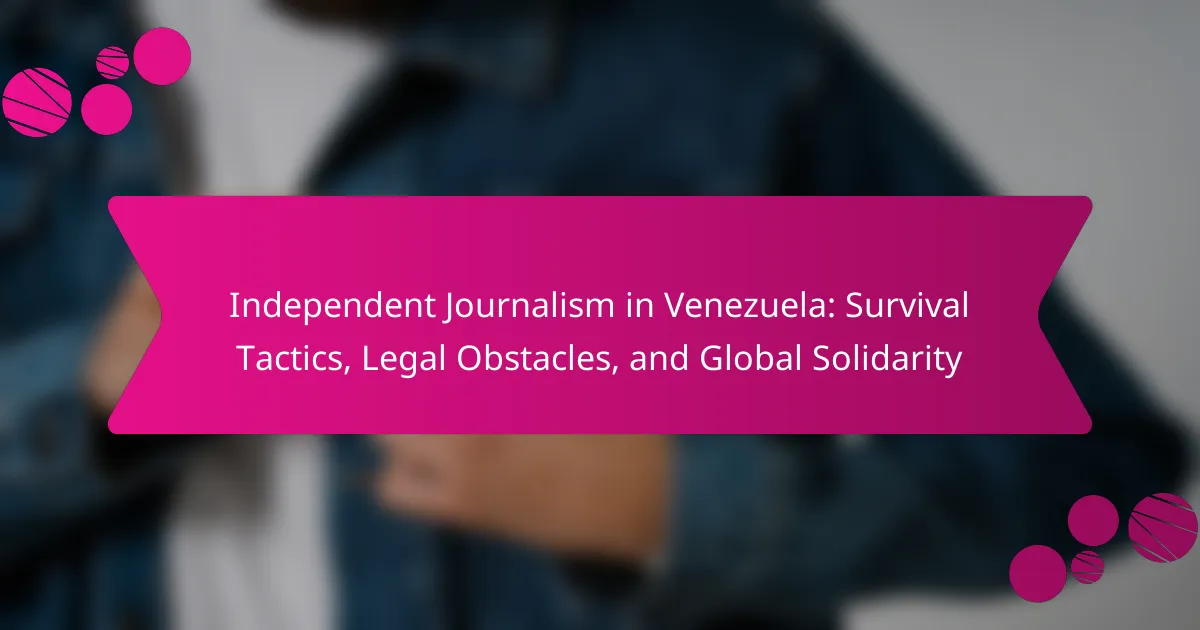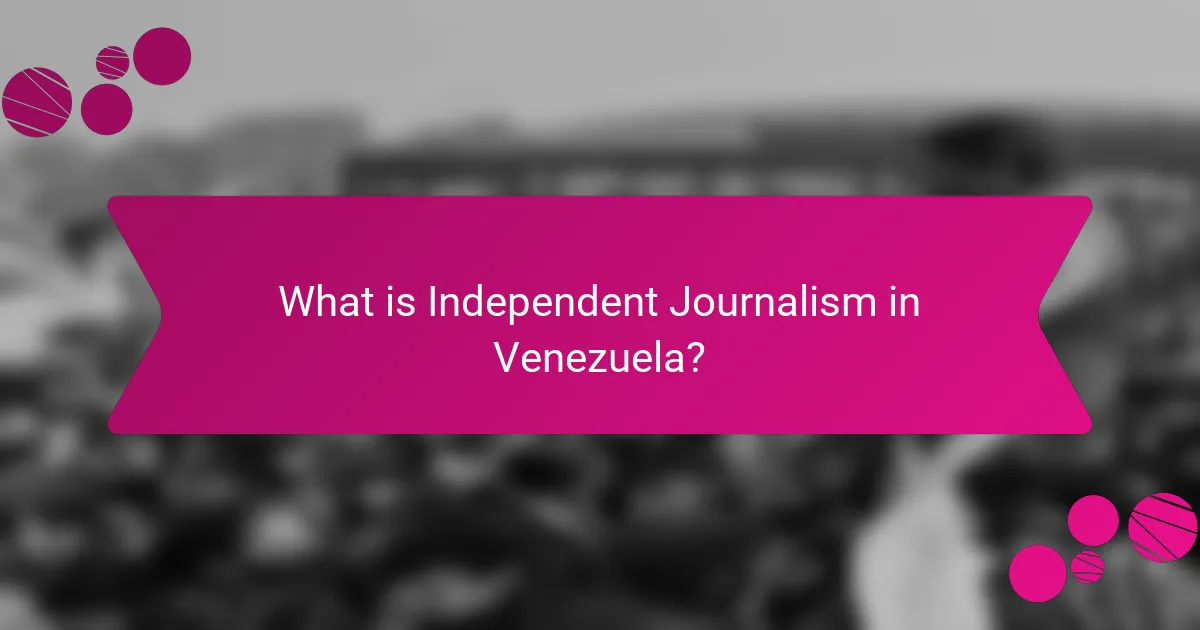
What is Independent Journalism in Venezuela?
Independent journalism in Venezuela refers to media practices that operate independently from government control. It aims to provide unbiased news coverage and analysis. This form of journalism faces significant challenges, including censorship and threats from authorities. According to the Committee to Protect Journalists, Venezuela ranks among the most dangerous countries for reporters. Many journalists work under constant risk of persecution or violence. Despite these obstacles, independent journalists strive to report on social and political issues. They often rely on digital platforms to bypass state restrictions. Their work is crucial for maintaining a free flow of information in a repressive environment.
How has independent journalism evolved in Venezuela?
Independent journalism in Venezuela has evolved significantly due to political repression and economic challenges. Over the years, many journalists have faced harassment, censorship, and violence. The government has implemented laws that restrict press freedom and limit independent reporting. Despite these challenges, journalists have developed innovative tactics to continue their work. Digital platforms and social media have become vital tools for disseminating information. Many independent outlets operate from abroad to evade censorship. International organizations have provided support and solidarity to Venezuelan journalists. This evolution reflects resilience in the face of adversity and a commitment to truth.
What historical events have shaped independent journalism in Venezuela?
The historical events that have shaped independent journalism in Venezuela include the 1999 constitutional reform and the rise of Hugo Chávez. The 1999 constitutional reform aimed to promote freedom of expression. However, it also allowed for government control over media. Chávez’s presidency, starting in 1999, marked a significant shift. He implemented policies that restricted press freedoms. The 2007 closure of RCTV, a major independent broadcaster, exemplified this trend. In 2013, Chávez’s death further intensified government repression of dissenting voices. The 2017 protests against the government led to increased violence against journalists. These events collectively illustrate the challenges faced by independent journalism in Venezuela.
How do cultural factors influence independent journalism in the country?
Cultural factors significantly influence independent journalism in Venezuela. The country’s historical context shapes media practices and public perception. Strong cultural ties to community and family impact journalistic narratives. Additionally, societal norms regarding authority affect journalists’ willingness to challenge power. Fear of repercussions from government entities often stifles critical reporting. Cultural expectations regarding loyalty can hinder objective journalism. The prevalence of misinformation complicates the public’s understanding of independent media. These dynamics create a challenging environment for journalists striving for truth and transparency.
Why is independent journalism important in Venezuela?
Independent journalism is crucial in Venezuela because it provides accurate information in a repressive environment. The country faces significant censorship and government control over media. Independent journalists often risk their lives to report on human rights abuses and corruption. Their work helps to inform citizens about political developments and social issues. Furthermore, independent journalism fosters accountability by exposing government failures. It also promotes democratic values and encourages public discourse. According to the Committee to Protect Journalists, Venezuela ranks among the most dangerous countries for journalists. This highlights the vital role that independent journalism plays in safeguarding freedom of expression.
What role does independent journalism play in promoting democracy?
Independent journalism plays a crucial role in promoting democracy by providing accurate information and holding power accountable. It enables citizens to make informed decisions and participate actively in governance. In democratic societies, independent journalism serves as a watchdog against corruption and abuse of power. It fosters transparency and encourages public debate on important issues. Studies show that countries with a strong independent press tend to have higher levels of democracy and citizen engagement. For example, the World Press Freedom Index indicates a correlation between press freedom and democratic governance. Thus, independent journalism is essential for sustaining democratic values and practices.
How does independent journalism contribute to public awareness and accountability?
Independent journalism enhances public awareness and accountability by providing unbiased information. It serves as a watchdog, exposing corruption and abuse of power. For example, independent journalists in Venezuela report on government actions that affect citizens. They investigate human rights violations and document social issues. This reporting informs the public, enabling informed decision-making. Studies show that countries with strong independent media experience higher levels of accountability. In Venezuela, independent journalism faces significant challenges yet remains crucial for transparency. This commitment helps hold authorities accountable to the populace.
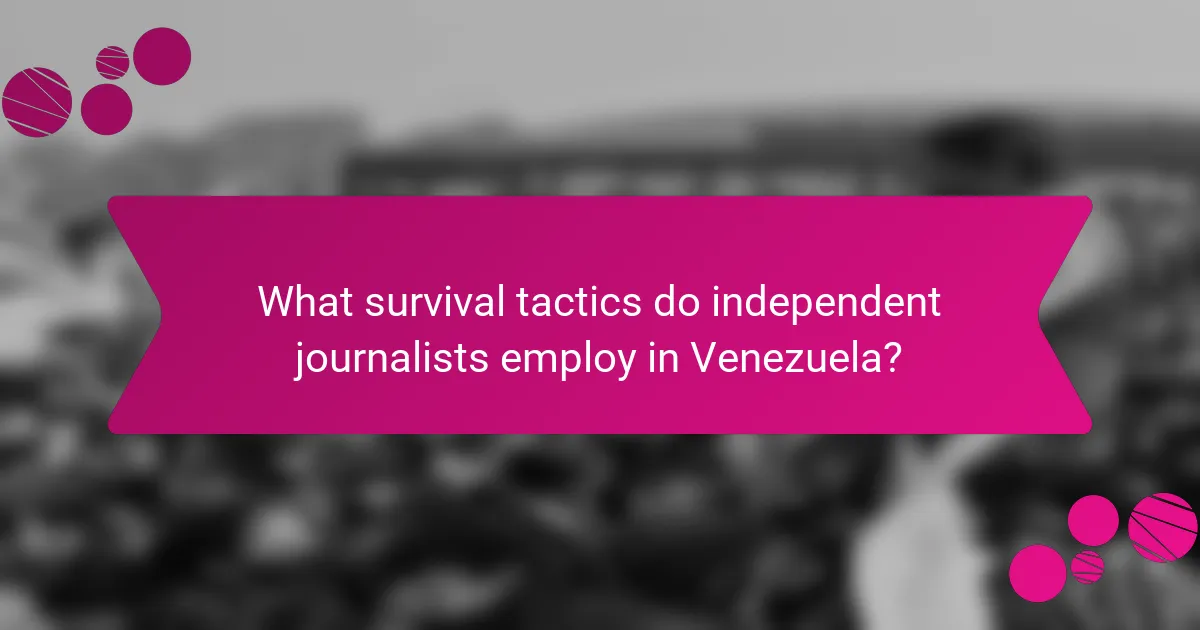
What survival tactics do independent journalists employ in Venezuela?
Independent journalists in Venezuela employ various survival tactics to navigate risks. They utilize digital security measures to protect their communications. Many journalists use encrypted messaging apps to avoid surveillance. They also rely on pseudonyms to maintain anonymity. Additionally, they build networks with international organizations for support. These networks provide resources and advocacy during crises. Journalists often share information through social media to reach broader audiences. They document abuses and human rights violations to raise awareness. Together, these tactics help them continue their work despite government repression.
How do journalists protect themselves from government repression?
Journalists protect themselves from government repression through various strategies. They often utilize anonymous communication tools to safeguard their identities. This includes encrypted messaging apps and secure email services. Many journalists also engage in collective reporting to share risks and resources. Training in security protocols is common among journalists facing threats. Legal support and advocacy organizations provide assistance in cases of repression. Additionally, international networks offer solidarity and pressure on oppressive regimes. These methods help mitigate the risks associated with reporting in hostile environments.
What safety measures are commonly adopted by independent journalists?
Independent journalists commonly adopt various safety measures to protect themselves. They often use secure communication tools to avoid surveillance. Many journalists utilize encrypted messaging apps like Signal or WhatsApp for sensitive discussions. They also employ physical safety tactics, such as varying their routes and schedules to avoid predictable patterns. Additionally, journalists frequently conduct risk assessments before covering sensitive stories. Training in first aid and self-defense is also common among independent journalists. They often collaborate with international organizations for support and resources. These measures are crucial in high-risk environments like Venezuela, where threats to journalists are prevalent.
How do journalists use technology to evade censorship?
Journalists use technology to evade censorship by utilizing encrypted communication tools. These tools protect their messages from interception by authorities. Virtual Private Networks (VPNs) allow journalists to access blocked websites and platforms. Tor browsers help maintain anonymity while browsing the internet. Secure file-sharing services enable the safe transfer of sensitive documents. Social media platforms are used to disseminate information widely and bypass state control. Additionally, journalists employ satellite phones in areas with disrupted internet services. These methods have been essential for maintaining independent journalism in oppressive environments like Venezuela.
What strategies do journalists use to secure funding and resources?
Journalists in Venezuela employ various strategies to secure funding and resources. They often seek grants from international organizations dedicated to press freedom. Crowdfunding platforms are also utilized to gather financial support from the public. Collaborations with foreign media outlets provide additional resources and funding opportunities. Journalists may also engage in partnerships with NGOs that focus on human rights and media support. Networking within the journalism community helps them access shared resources and funding information. Additionally, some journalists monetize their content through subscription models or merchandise sales. These strategies collectively enhance their ability to operate despite economic challenges.
How do independent journalists collaborate with international organizations?
Independent journalists collaborate with international organizations through information sharing and joint investigations. They often receive funding and resources from these organizations to support their work. Independent journalists provide local insights and context that enhance the effectiveness of international efforts. Organizations may offer training and capacity-building programs to strengthen journalistic skills. Collaborations can also include publishing joint reports on human rights and freedom of the press. Such partnerships help amplify the voices of independent journalists in restrictive environments. Evidence shows that these collaborations can lead to increased visibility and advocacy for press freedom. For example, the Committee to Protect Journalists often partners with local reporters in crisis regions to document abuses.
What role do crowdfunding and donations play in supporting independent journalism?
Crowdfunding and donations are crucial for supporting independent journalism. They provide financial resources that traditional funding sources often neglect. In Venezuela, independent media face severe economic constraints. Crowdfunding platforms enable journalists to reach a global audience for financial support. Donations from individuals can help sustain operations and pay for essential resources. This model fosters community engagement and accountability. According to a 2021 report by the Committee to Protect Journalists, more than 50% of independent Venezuelan media rely on external funding. This reliance highlights the importance of crowdfunding and donations in maintaining journalistic integrity and freedom.
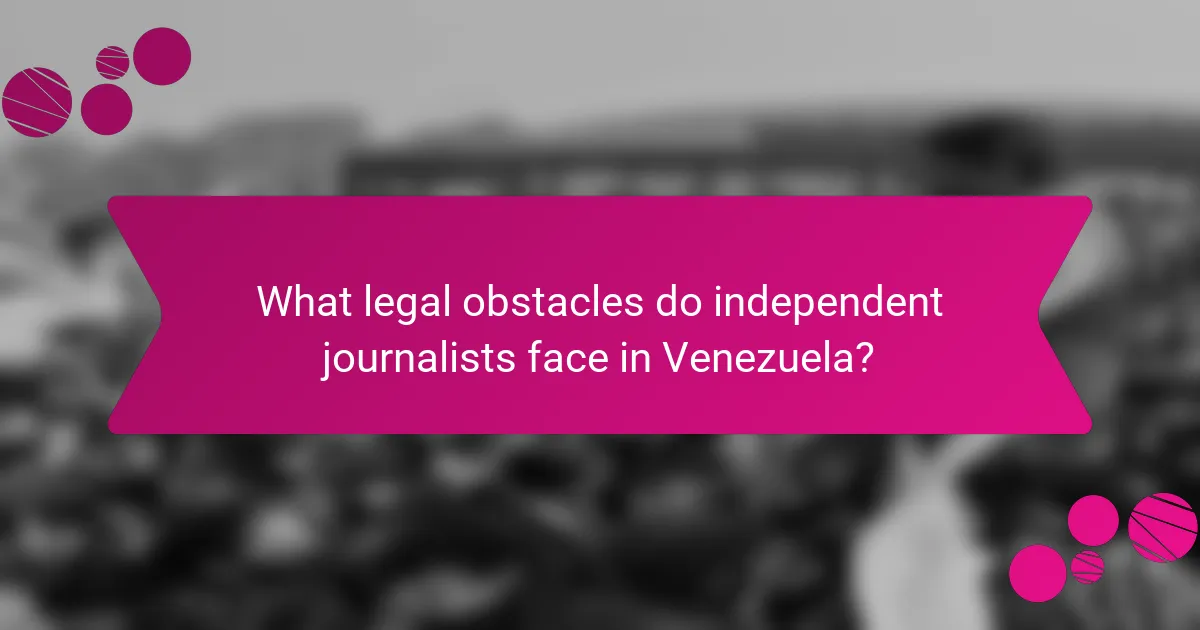
What legal obstacles do independent journalists face in Venezuela?
Independent journalists in Venezuela face significant legal obstacles. The government imposes strict regulations that limit press freedom. Journalists often encounter harassment and intimidation from authorities. There are laws that criminalize defamation and slander, leading to potential imprisonment. Additionally, independent media outlets struggle with licensing issues. The government frequently denies permits to operate, effectively stifling dissenting voices. Reports indicate that many journalists have been forced into exile due to these oppressive conditions. The legal environment creates a climate of fear, hindering investigative reporting. These obstacles severely restrict the ability of independent journalists to operate freely and safely in Venezuela.
What are the key laws affecting independent journalism in Venezuela?
The key laws affecting independent journalism in Venezuela include the Law on Social Responsibility in Radio and Television (2004) and the Law Against Hate (2017). The Law on Social Responsibility restricts media content and mandates compliance with government directives. It imposes heavy fines and potential closure for non-compliance. The Law Against Hate criminalizes expressions deemed to incite violence or promote intolerance. This law has been used to suppress dissent and limit freedom of expression. Additionally, the Penal Code includes provisions that penalize defamation and insult against public officials. This legal framework creates a hostile environment for independent journalism. Journalists often face harassment, intimidation, and legal repercussions under these laws.
How do laws regarding censorship impact journalistic freedom?
Laws regarding censorship significantly restrict journalistic freedom. In Venezuela, strict censorship laws limit what journalists can report. These laws often lead to self-censorship among media professionals. Journalists may avoid sensitive topics to evade legal repercussions. The government can impose fines or jail time for violations. This creates an environment of fear and uncertainty. Consequently, many independent outlets are forced to shut down. The overall result is a diminished public discourse and lack of accountability.
What legal risks do journalists encounter in their work?
Journalists in Venezuela encounter several legal risks in their work. These include threats of imprisonment for defamation or spreading false information. The government often uses laws to suppress dissenting voices. Journalists face harassment and intimidation from authorities. They may also experience censorship and confiscation of equipment. Legal actions can be taken against them for reporting on sensitive topics. In recent years, at least 100 journalists have faced legal charges. This environment creates significant challenges for independent journalism in the country.
How does the government respond to independent journalism?
The Venezuelan government responds to independent journalism with censorship and intimidation. Authorities frequently shut down media outlets that criticize the government. Journalists face harassment, threats, and legal repercussions for their reporting. The government employs tactics such as blocking websites and confiscating equipment. In 2020, the Inter American Press Association reported over 130 instances of media repression. These actions aim to stifle dissent and control the narrative. Independent journalism struggles to survive under these oppressive conditions. Despite this, many journalists continue to report, often risking their safety.
What tactics does the government use to intimidate journalists?
The government uses various tactics to intimidate journalists in Venezuela. These tactics include harassment, censorship, and legal persecution. Journalists often face threats and physical violence for reporting on sensitive issues. Authorities frequently shut down media outlets that criticize the government. Surveillance of journalists is common, leading to self-censorship. Additionally, the government employs disinformation campaigns to undermine journalistic credibility. These strategies create a hostile environment for independent journalism. Reports from organizations like Human Rights Watch highlight these ongoing threats to press freedom in Venezuela.
How do journalists navigate legal challenges in their reporting?
Journalists navigate legal challenges in their reporting by adhering to established laws and ethical guidelines. They often consult legal experts to understand the implications of their work. This includes knowledge of defamation, privacy laws, and national security regulations. In Venezuela, journalists face additional risks due to government censorship and repression. They may use anonymous sources to protect their identities and avoid legal repercussions. Documenting evidence meticulously helps them defend against potential legal actions. Collaboration with international organizations can provide legal support and advocacy. These strategies are crucial for maintaining journalistic integrity and safety in a challenging environment.
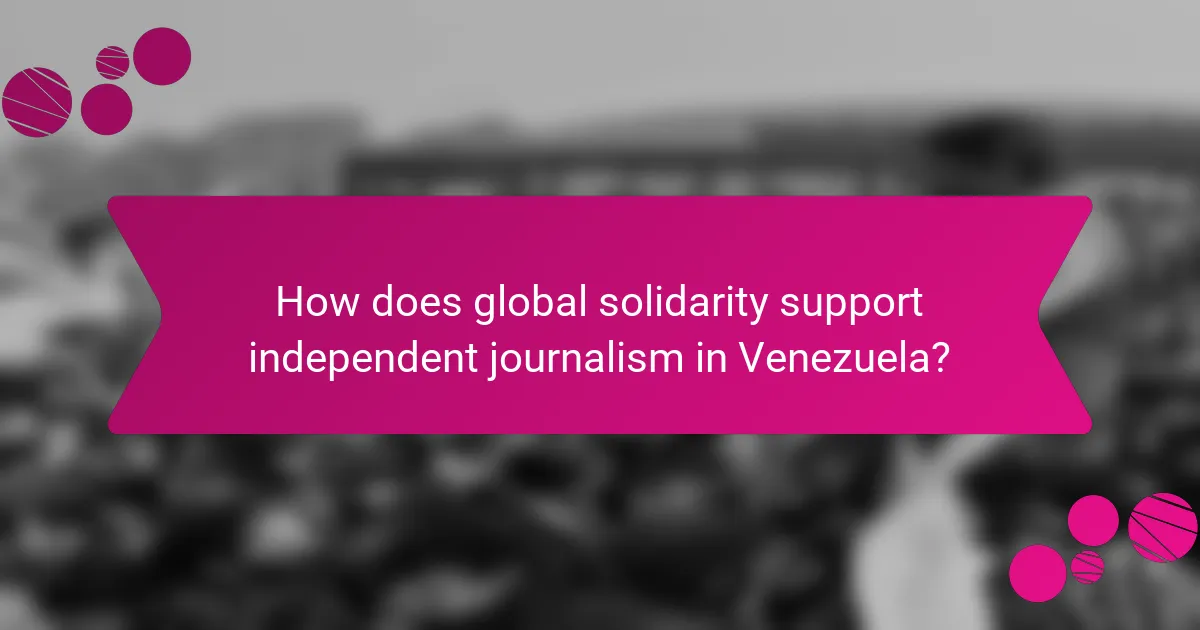
How does global solidarity support independent journalism in Venezuela?
Global solidarity supports independent journalism in Venezuela by providing financial resources, training, and advocacy. International organizations and foreign governments often fund independent media initiatives. This funding helps journalists operate despite economic hardships and state repression. Training programs enhance skills in investigative reporting and digital security. Advocacy efforts raise awareness of threats against journalists. These actions promote freedom of expression and press independence. Reports indicate that global solidarity has led to increased visibility for Venezuelan journalists. This visibility attracts further support and resources, fostering resilience in the media landscape.
What international organizations advocate for Venezuelan journalists?
International organizations that advocate for Venezuelan journalists include the Committee to Protect Journalists (CPJ), Reporters Without Borders (RSF), and the Inter American Press Association (IAPA). CPJ monitors press freedom violations and provides support to journalists in danger. RSF publishes annual reports on press freedom and campaigns for the release of imprisoned journalists. IAPA promotes freedom of expression and supports journalists facing persecution in the Americas. These organizations work to raise awareness and provide resources for Venezuelan journalists under threat.
How do global networks provide resources and support to independent journalists?
Global networks provide resources and support to independent journalists through funding, training, and access to information. They offer financial grants to help sustain journalistic projects. These networks also conduct workshops to enhance journalistic skills. Furthermore, they facilitate connections with other journalists for collaboration and knowledge sharing. Access to databases and research materials is another critical resource. These networks advocate for press freedom and provide legal assistance when needed. Their support helps journalists navigate challenging environments, such as those in Venezuela. This multifaceted approach strengthens the resilience of independent journalism globally.
What impact does international pressure have on the Venezuelan government?
International pressure significantly affects the Venezuelan government. It can lead to sanctions that restrict financial resources. These sanctions often target key officials and state-owned enterprises. As a result, the Venezuelan government faces economic challenges. International condemnation can also diminish the government’s legitimacy. This pressure often comes from organizations like the United Nations and countries like the United States. For instance, the U.S. imposed sanctions in 2015, aiming to hold officials accountable for human rights abuses. Such actions can provoke policy changes or, conversely, lead to increased repression. Overall, international pressure plays a crucial role in shaping the Venezuelan government’s actions and policies.
How can individuals contribute to the support of independent journalism in Venezuela?
Individuals can contribute to the support of independent journalism in Venezuela by donating to local media organizations. Financial support helps these organizations maintain operations amidst economic challenges. Subscribing to independent news outlets also provides necessary revenue. Sharing articles on social media increases their reach and visibility. Volunteering skills, such as writing or graphic design, can aid independent journalists. Advocating for press freedom raises awareness about the challenges they face. Supporting international campaigns that promote Venezuelan journalism can amplify their voices globally. Engaging in discussions about the importance of independent journalism fosters a supportive community.
What actions can global citizens take to help Venezuelan journalists?
Global citizens can support Venezuelan journalists by advocating for press freedom and human rights. They can raise awareness through social media campaigns. This helps to highlight the challenges faced by journalists in Venezuela. Additionally, citizens can donate to organizations that provide legal assistance to journalists. Supporting independent media outlets financially is another effective action. Engaging with international bodies to pressure the Venezuelan government is also crucial. Lastly, participating in or organizing events that promote journalism can foster global solidarity. These actions collectively contribute to a safer environment for journalists in Venezuela.
How can awareness and advocacy campaigns make a difference?
Awareness and advocacy campaigns can significantly influence public perception and policy change. They educate the public about critical issues, such as the challenges faced by independent journalism in Venezuela. By highlighting these challenges, campaigns can mobilize support for journalists and press freedom. Research indicates that increased public awareness can lead to greater international pressure on governments to uphold human rights. For instance, campaigns have successfully garnered attention from global organizations, resulting in sanctions against oppressive regimes. Moreover, advocacy efforts can create networks of solidarity among journalists, fostering collaboration and resource sharing. Ultimately, these campaigns play a crucial role in sustaining independent journalism and promoting democratic values.
What are the best practices for supporting independent journalism in challenging environments?
Supporting independent journalism in challenging environments involves several best practices. First, providing financial support is crucial. This can be achieved through donations, grants, or crowdfunding. Second, enhancing safety measures for journalists is essential. This includes training on digital security and physical safety protocols. Third, fostering partnerships with international organizations can amplify local voices. Collaborations can provide resources and visibility. Fourth, advocating for press freedom is vital. Engaging in campaigns can raise awareness about threats to journalism. Fifth, utilizing technology to bypass censorship is important. Tools like VPNs and encrypted communication can protect journalists. Lastly, promoting community engagement can strengthen local journalism. Building trust within communities can enhance the impact of independent reporting.
Independent journalism in Venezuela represents media practices that operate autonomously from government influence, aiming to deliver unbiased news despite facing severe challenges such as censorship, violence, and legal obstacles. The article explores the evolution of independent journalism in the country, shaped by historical events and cultural factors, and emphasizes its critical role in promoting democracy and accountability. It highlights the survival tactics employed by journalists, including digital security measures and international collaborations, while detailing the legal risks they encounter. Additionally, the article discusses the impact of global solidarity in supporting Venezuelan journalists through funding, training, and advocacy efforts to uphold press freedom.
